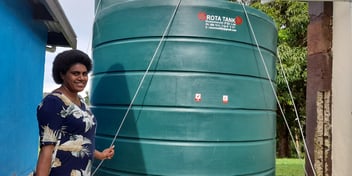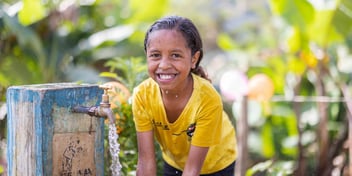Novel engineering approach to provide sustainable and equal WASH
Bringing women’s opinions to the table is an important step in tackling disproportionate access to water, sanitation and hygiene (WASH), says one award-winning young water professional.
Winner of the New South Wales Australian Water Association Young Water Professional of the Year award, Dr Tanja Rosenqvist, completed her PhD exploring the sustainability of decentralised sanitation services in Indonesia, using participatory design approaches to involve community members in decision-making.
Rosenqvist said the issue of gendered access to water and sanitation is not only about technological design, but about addressing systemic hurdles and boundaries such as funding and management models.
“[If these are] dominated by men, the female voice will be missing,” she said.
“I try to bring women’s voices in, talking equally with men and women in the community. But, since community leaders, at least in Indonesia, tend to be male, key decision-making processes are dominated by men.”
With a background in human-centred design, Rosenqvist is now helping lead a novel academic field and approach to international development at RMIT: humanitarian engineering. It’s a field she describes as engineering with knowledge and methods drawn from international studies and anthropology.
 Dr Tanja Rosenqvist in Indonesia
Dr Tanja Rosenqvist in Indonesia
“Humanitarian engineering is a fairly new field in Australia,” Rosenqvist said.
“It is broadly defined in Australia as engineering for international development contexts, as well as engineering in emergency and disaster response. But it is also about inclusive design.
“If you're not from a place you are working, you don't necessarily have the same cultural understanding of what's happening there. You really need to go out and dig into it to be able to design a solution that will work, otherwise you end up making a lot of assumptions.”
Rosenqvist said ‘truck and chuck’ – the tendency to provide technological solutions to developing communities without addressing operation or maintenance issues – is one of the issues her design research aims to address.
While employed by an international NGO in Indonesia, Rosenqvist had an eye-opening project experience, which demanded a more nuanced approach to development.
“For one of our projects, I was asked to design a water filter for schools in rural Cambodia,” she said.
“As part of my process, I go and look at the context for the design and talk with a lot of people there to try and understand their needs.
“We went to visit a school and were very surprised to see that there were plenty of water filters. There were water filters everywhere, but none of them worked. We found one classroom that had empty water bottles stored inside a broken ceramic water filter, stored inside a broken sand filter.
 Empty water bottles at a school in Cambodia
Empty water bottles at a school in Cambodia
“I realised that it's often not a question of providing the technologies. It's really about making sure that services become long-term sustainable. And there's a very, very big difference.”
Rosenqvist said the example shows there is a need to change the approach being taken to water and sanitation in development contexts.
“It was really a clear example that we need another approach to development,” she said.
“In that particular case, it's not about giving water filters to schools. It's really about schools getting funding for maintenance.
“The technology needed is often already there. It's implemented, it's done, it's dusted. The challenge is maintaining it.
“Bringing community leaders and relevant stakeholders from local government together to try and design alternative management models is the next hurdle that needs to be addressed. It’s about figuring out how to provide the service continuously and sustainably.”


